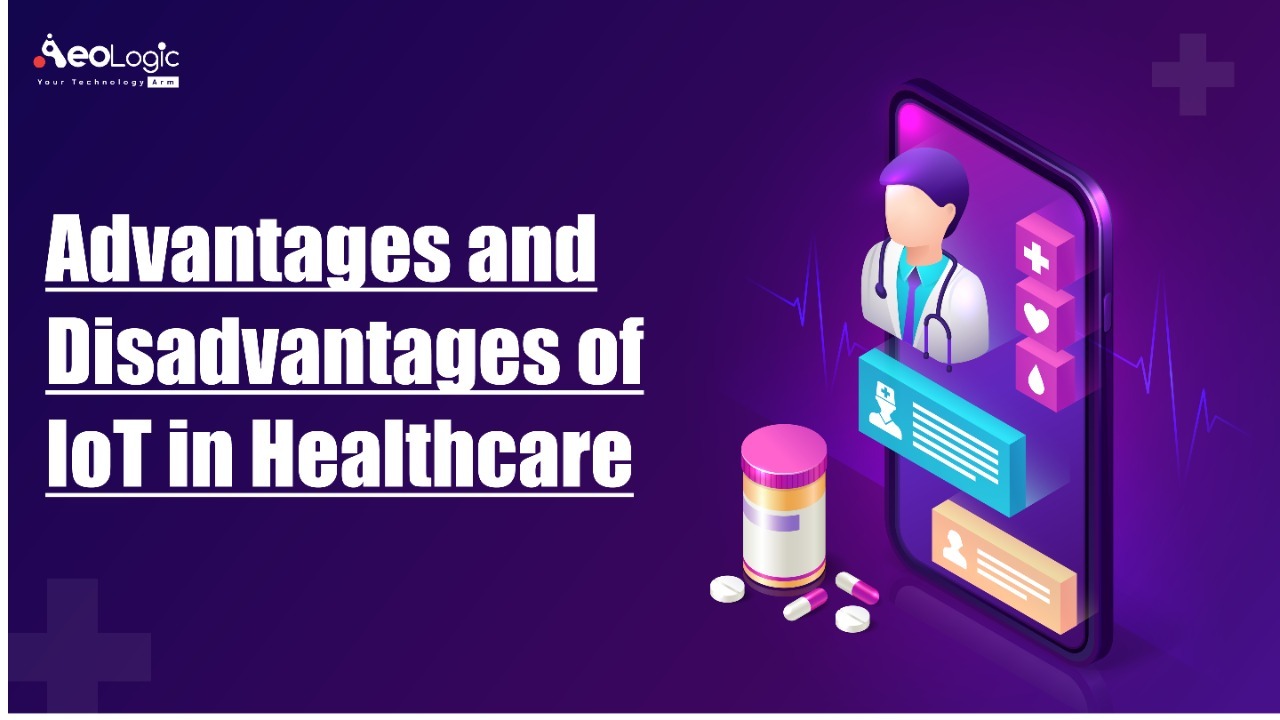The Internet of Things (IoT) is quickly getting popularity in all aspects of life, healthcare systems in particular. In a nutshell, technology is allowing multiple connected devices to collect and share information with each other. However, there are certain advantages and disadvantages of IoT in healthcare.
Also read: Digital Transformation Examples in Healthcare
What Does This Mean For Healthcare?
In fact, the applications are so varied that you probably wouldn’t believe these are real-life examples. Following are just a few:
- Symptom-tracking apps that are sending updates on responses to cancer treatment to the physician and which can prevent hospitalization
- Connected hospital equipment that helps in notifying doctors of their present location, informs the hospital management of the replacement requirements, and monitors staff performance
- Remote temperature monitoring is making sure the correct transportation and storage of vaccines
- Healthcare IT solutions help in reminding patients to refill medication and digestible sensors that trigger a notification if the medication hasn’t been taken on time
- Continuous Glucose Monitors (CGM) and smart insulin pens that record and recommend the time and the amount of insulin dose injection which come as prevention to diabetics
- Smart inhalers connected to an app that are helping people with asthma and pulmonary disease understand what is causing the symptoms and predict allergens
Provided such examples, the Internet of Things (IoT) is seen as a way of living a safer and smarter life. And its implementation is highly encouraged in medical establishments. Nonetheless, we will be discussing the advantages and disadvantages of IoT in healthcare. However, digital transformation in healthcare isn’t without challenges.
Major Advantages of IoT in Healthcare
The overall significance of healthcare software solutions is difficult for overestimating as technology promises to make healthcare services more effective. And also helps in alleviating the burden placed on healthcare providers. This is crucial in the context of the aging population and the increasing number of chronic diseases.
The Major Advantages of IoT Implementation in Healthcare:
- Remote monitoring: Real-time remote monitoring with connected IoT devices and smart alerts is helping in diagnosing illnesses, treating diseases, and saving lives in case of a medical emergency.
- Prevention: Smart sensors are analyzing health conditions, lifestyle choices, and the environment and recommend preventative measures. Which will be reducing the occurrence of diseases and acute states.
- Reduction of healthcare costs: Moreover, IoT is also reducing costly visits to doctors and hospital admissions and making testing more affordable.
- Medical data accessibility: Accessibility of electronic medical records are allowing patients to receive quality care and helping healthcare providers make the right medical decisions and prevent complications.
- Improved treatment management: IoT devices are helping in tracking the administration of drugs and the response to the treatment and reducing medical errors.
- Improved healthcare management: Using IoT devices, healthcare authorities are able to get valuable information about equipment and staff effectiveness and use it to suggest innovations.
- Research: Since IoT devices can collect and analyze a huge amount of data, they have a high potential for medical research purposes.
IoT in Healthcare: Challenges and Threats
Although the Internet of Things can be of great advantage to the healthcare industry, there are still major challenges to address before full-scale implementation. The threats and disadvantages of using connected devices in the healthcare industry are as follows:
- Security and privacy: Security and privacy are still a major concern deterring users from implementing IoT technology for medical purposes. Since healthcare monitoring solutions have the potential to be breached or hacked. The leak of sensitive information regarding the patient’s health and location and meddling with sensor data can have serious consequences, which would counter the benefits of IoT.
- Risk of failure: Failure or bugs in the hardware system or even power failure will be impacting the performance of sensors and connected equipment. Hence, placing healthcare operations at risk. In addition, skipping a software update may be even more hazardous than skipping a doctor’s checkup.
- Integration: Furthermore, there’s no consensus about IoT protocols and standards. So, devices produced by different manufacturers may not operate well together. The lack of uniformity is preventing full-scale integration of IoT. Therefore, limiting its potential usefulness.
- Cost: While IoT is promising to decrease the cost of healthcare in the long term, the cost of its implementation in hospitals and staff training is pretty much high.
Also read: The Importance of Information Technology in Healthcare
The Future of IoT in Healthcare
This article has pinned down the advantages and disadvantages of IoT in healthcare. Such development will be due to the high demand, the improvement of 5G connectivity and IoT technology. And the increasing acceptance of healthcare IT software. The plans of tech giants like Google, Apple, and Samsung to invest in bridging the gap between fitness-tracking apps. And actual medical care are sure to contribute to the procedure too.
Irrespective of the downsides, further digital transformation in healthcare is inevitable. And the concept of IoT will continue to capture and modify the landscape of healthcare services. Therefore, it is seeming to be high time to look beyond the challenges. And embark on the journey to connected healthcare devices.
Get in touch with us to know more about IoT Solutions.
If you are also interested in taking an initiative in the medical sector and looking for industry experts, kindly collaborate for a collective effort. Do not hesitate to contact us.
FAQs
How IoT helps in improving healthcare?
Improved Treatment: It is enabling physicians to make evidence-based informed decisions and brings absolute transparency.
Faster Disease Diagnosis: Real-time data and continuous patient monitoring help in diagnosing diseases at an early stage. Or even before the disease develops based on symptoms.
What is the scope of IoT in healthcare?
IoT is automating the workflow of patient care with the help of healthcare mobility solutions. It is enabling interoperability, data movement, machine-to-machine communication, and information exchange while making healthcare delivery more productive.










